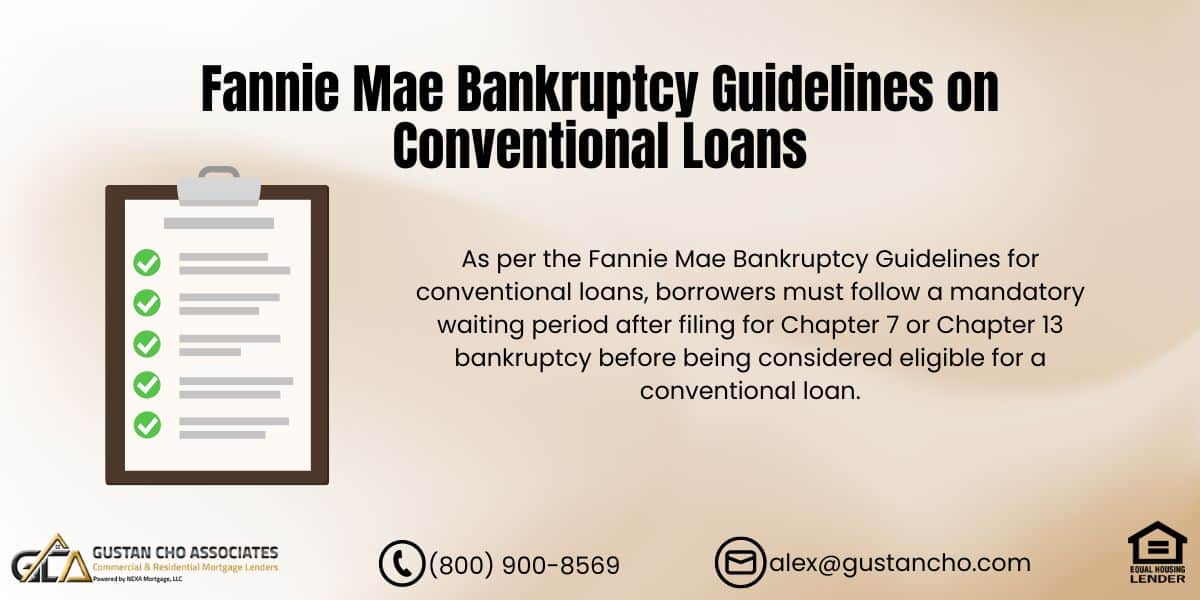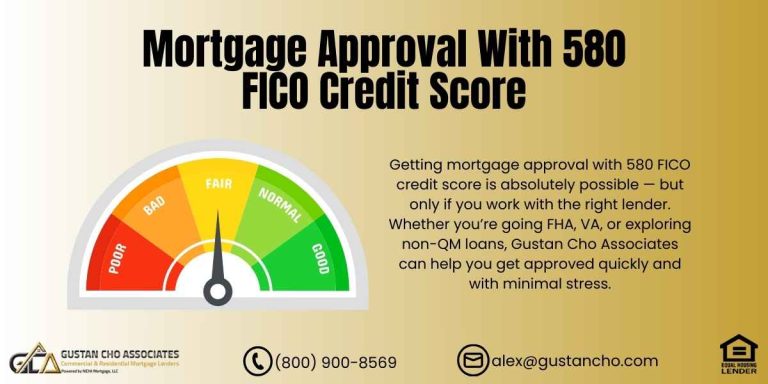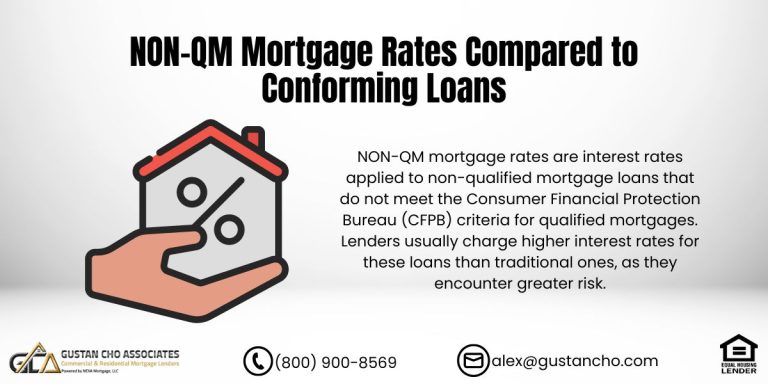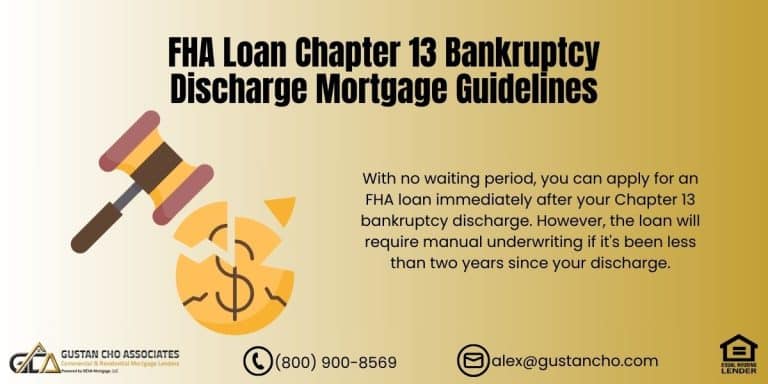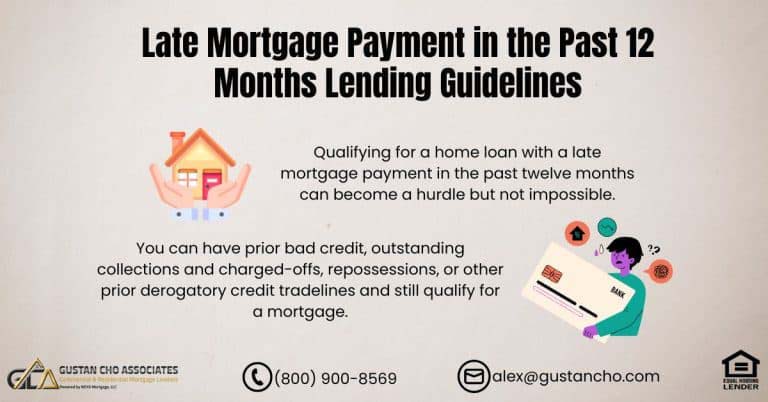As per the Fannie Mae Bankruptcy Guidelines for conventional loans, borrowers must follow a mandatory waiting period after filing for Chapter 7 or Chapter 13 bankruptcy before being considered eligible for a conventional loan. While it is possible for mortgage borrowers to obtain a loan post-bankruptcy, they must first satisfy the required waiting period to be considered for government-backed or conventional loans.
More than simply meeting the mandatory waiting period does not guarantee approval for a home mortgage. Lenders expect borrowers to have rebuilt and reestablished their credit following a bankruptcy or a significant housing event, with no late payments recorded post-bankruptcy or post-foreclosure. Importantly, having a previous bankruptcy does not affect the interest rates offered on government or conventional loans.
Getting A Home Mortgage After Bankruptcy
Individuals can utilize bankruptcy as a legal process to start their financial life afresh. Certain conditions must be met for homebuyers to obtain a mortgage following bankruptcy. Conventional mortgage loans are subject to the Fannie Mae Bankruptcy Guidelines and other criteria established by Fannie Mae and Freddie Mac.
The Federal Housing Administration, a United States Department of Housing and Urban Development (HUD) branch, sets mortgage lending guidelines for FHA loans. The guidelines for qualifying for a mortgage after bankruptcy, such as the Fannie Mae Bankruptcy Guidelines, vary depending on the type of loan, whether it be FHA, Fannie Mae, or Freddie Mac.
Had a Bankruptcy? You May Still Qualify for a Fannie Mae Loan
Conventional loans are possible after Chapter 7 or Chapter 13—if you meet the waiting period. Check Your Conventional Loan Eligibility Today!What is the Waiting Period for a FHA Bankruptcy?
Under Fannie Mae Bankruptcy Guidelines, a four-year waiting period from the Chapter 7 Bankruptcy discharge date is required to qualify for conventional loans. However, adhering to this mandatory waiting period only ensures approval for a conventional mortgage loan.
Lenders want a restored and stable credit history post-bankruptcy, with no late payments. One or two late payments following bankruptcy may not necessarily prevent loan approval.
If you have faced delays in payment following bankruptcy, kindly contact Gustan Cho Associates to evaluate possible solutions for obtaining a mortgage. Furthermore, borrowers must adhere to other essential requirements as per the Mortgage Lending Guidelines of Fannie Mae and Freddie Mac, which include:
- Debt-to-income ratios
- Credit scores
- Late payments following a housing event or bankruptcy
- Credit history post-bankruptcy
Re-establishing credit according to the Automated Underwriting System (AUS) is necessary to reach an approved/eligible status for a conventional loan after filing for Chapter 7 or Chapter 13 Bankruptcy.
Chapter 13 Fannie Mae Bankruptcy Guidelines
Fannie Mae Bankruptcy Guidelines on waiting period after Chapter 13 Bankruptcy a two-year waiting period after a Chapter 13 Bankruptcy discharge date. Four year waiting period after a Chapter 13 dismissal date. A Chapter 13 dismissal is when the consumer did not complete the Chapter 13 Bankruptcy. Either canceled the Chapter 13 Bankruptcy repayment plan or could no longer qualify for a Chapter 13 Bankruptcy repayment program due to extenuating circumstances like a loss of job or other income.
What are the Extenuating Circumstances for Fannie Mae?
As per Fannie Mae, Extenuating circumstances refer to unexpected events beyond the borrower’s control and lead to a sudden, significant, and long-term decline in income or an unforeseen and massive increase in financial obligations.
To qualify as extenuating circumstances, the situation must be one that the borrower could not reasonably have avoided and must have directly contributed to a significant loss of household income or an increase in the household’s financial obligations.
Here are examples of situations typically considered as extenuating circumstances:
- The serious illness or death of a breadwinner: The illness or death must have directly impacted the household’s finances.
- Divorce: This is not typically considered an extenuating circumstance on its own unless the divorce causes a significant impact on the borrower’s financial condition that is out of their control.
- A natural disaster is a disaster that impacts the property or the borrower’s employment.
- Job loss: Involuntary job loss can be considered if it significantly impacts the borrower’s income.
For Fannie Mae to consider these circumstances, borrowers must provide documentation supporting their claims, such as medical bills, death certificates, proof of job loss, divorce decrees, etc. Additionally, borrowers need to demonstrate that they have recovered from the event financially and in terms of creditworthiness. Typically, this involves showing a satisfactory credit history for at least the 12 months preceding the mortgage application.
It’s important to check directly with Fannie Mae’s latest guidelines or consult a mortgage professional for the most accurate and up-to-date information, as policies can change and may have specifics that need to be addressed on a case-by-case basis.
Minimum Credit Score and Down Payment Requirements

To qualify for conventional loans, borrowers need a minimum of a 620 credit score. The minimum credit score required for FHA Loans is 580 FICO. The minimum down payment requirements for conventional loans are 3% for first-time homebuyers with Fannie Mae. 3% down payment with Freddie Mac as long as the home buyer did not own a home in the past three years. Otherwise, the minimum down payment requirement on conventional loans is a 5% down payment on a home purchase.
Fannie Mae And Freddie Mac DTI Guidelines
The maximum debt-to-income ratio allowed for conventional loans is 50% DTI. There is no front-end debt-to-income ratio requirements on conventional loans. As long as the DTI does not exceed 50% DTI, borrowers should get approve/eligible per AUS.
With FHA, the maximum debt-to-income ratio allowed is 46.9% front end and 56.9% DTI back end to get an approve/eligible per automated underwriting system.
The borrower needs credit scores of 620 FICO or higher to be eligible for the 46.9%/56.9% DTI. If the FHA borrower has credit scores below 620 FICO, the debt-to-income ratio caps gets reduced to 43% DTI. Most lenders do not want to see borrowers have any late payments after Chapter 7 and Chapter 13 Bankruptcy. The lender wants to see borrowers re-established credit after bankruptcy and have been timely on their minimum monthly payments.
Ready to Buy After Bankruptcy? Fannie Mae Says You Can
Don’t let your past stop your future. Start Your Conventional Loan Application Today!Are Mortgage Rates Higher With A Prior Bankruptcy On Conventional Loans?
Many borrowers assume that they will get a higher mortgage rate because they have a bankruptcy showing on their credit report. This is not true. Mortgage rates have nothing to do with a prior bankruptcy and are based on the following:
- Credit scores
- The down payment on the home purchase
- Any down payment under 20% down payment will command a higher mortgage rate, and private mortgage insurance will be required.
- The type of property will affect mortgage rates on conventional loans
Condominiums and 2 to 4-unit properties will yield a higher mortgage rate on conventional loans.
Mortgage Part Of Bankruptcy
A great new Fannie Mae Bankruptcy guidelines that were implemented and launched in 2014 is that if a consumer had a mortgage part of the bankruptcy. If the borrower had a mortgage part of bankruptcy and foreclosure was finalized after the Chapter 7 Bankruptcy, the waiting period clock starts from the date of the discharge date of the Chapter 7 Bankruptcy.
The date of the foreclosure and/or short sale does not matter. The housing event does need to be finalized. Borrowers cannot have reaffirmed the mortgage. There is a four-year waiting period from the discharge date of the Chapter 7 Bankruptcy. This holds true even though the foreclosure was recorded later after the Chapter 7 Bankruptcy to qualify for a conventional loan.
This is different than with FHA Loans. With FHA Loans, if you had a mortgage part of bankruptcy, there is a three-year waiting period from the recorded date of the foreclosure or date of the sheriff’s sale to qualify for an FHA Loan.
There are times when lenders take their sweet time in transferring the deed of the property into the lender’s name. This will hurt the potential home buyer because the waiting period clock does not start until the recorded foreclosure date has been recorded on the county’s recorder of deeds office.
Homebuyers who had a mortgage part of the bankruptcy and need to qualify for a conventional loan, please get in touch with us at Gustan Cho Associates at 800-900-8569 or text us for a faster response. Or email us at gcho@gustancho.com. The team at Gustan Cho Associates is available seven days a week, evenings, weekends, and holidays.
FAQ: Fannie Mae Bankruptcy Guidelines on Conventional Loans
1. What is the period to qualify for a conventional loan after a Chapter 7 bankruptcy? If you’re interested in applying for a conventional loan, you must wait four years from the discharge date of your Chapter 7 Bankruptcy. Fannie Mae sets this waiting period, which must be met before a mortgage can be approved.
2. What happens if I had a Chapter 13 bankruptcy? For a Chapter 13 Bankruptcy, there is a two-year waiting period from the discharge date to qualify for a conventional loan. If the Chapter 13 bankruptcy was dismissed, a four-year waiting period applies.
3. Are there any exceptions to the bankruptcy waiting periods?Yes, Fannie Mae may consider reducing the waiting period in extenuating circumstances beyond the borrower’s control, such as a serious illness or job loss. Documentation and proof of recovery from the financial setback are required.
4. How does bankruptcy affect my ability to get a mortgage with Fannie Mae or Freddie Mac? While bankruptcy does impose mandatory waiting periods, meeting these periods does not automatically qualify you for a mortgage. Borrowers must also rebuild and reestablish their credit post-bankruptcy, demonstrating timely payments and fulfilling other credit qualifications.
5. What is the credit score and down payment needed for a conventional loan at a minimum? Typically, Fannie Mae requires a credit score of at least 620 for loan approval. If you’re a first-time homebuyer, the minimum down payment is 3%, while others generally require 5%.
6. What debt-to-income ratio is acceptable for conventional loans? The maximum debt-to-income ratio allowed for conventional loans is 50%. There are no front-end debt-to-income requirements as long as the overall DTI does not exceed this limit.
7. Are mortgage rates higher for borrowers with a prior bankruptcy? No, having a prior bankruptcy does not directly affect mortgage rates. Rates are based on credit scores, down payment amounts, and the financed property type.
8. What should I know about mortgages included in a bankruptcy? A significant guideline from Fannie Mae states that if a mortgage was included in a bankruptcy, the waiting period to qualify for a new loan starts from the bankruptcy discharge date, regardless of when the foreclosure was recorded.
For more specific advice and updates on guidelines, contacting a mortgage professional or directly consulting with Fannie Mae’s resources is recommended. If you need assistance or have specific situations like late payments after a bankruptcy, consulting with experts like those at Gustan Cho Associates can be beneficial.
This blog about the Fannie Mae Bankruptcy Guidelines on Conventional Loans was updated on April 17th, 2024.


